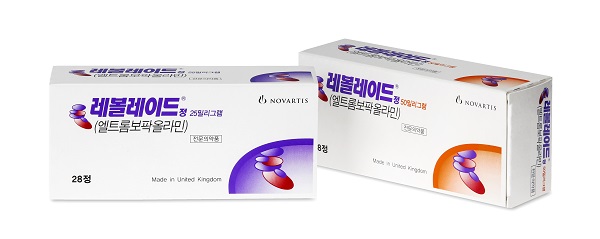
Novartis Korea’s Revolade (ingredient: eltrombopag) can now be used to treat people with severe aplastic anemia who have not shown sufficient response to immunosuppressive therapy.
Severe aplastic anemia is a severe blood disease where the bone marrow does not produce enough blood cells for the body, leading to complications such as fatigue, dyspnea, and abnormal bruising or bleeding.
The Ministry of Food and Drug Safety gave the go-ahead for the additional indication on May 11. Revolade is used to treat thrombocytopenia – a rare condition where the patient has low blood platelet count.
Currently, the standard therapy for severe aplastic anemia is immunosuppressive therapy or hematopoietic stem cell transplantation. Novartis Korea noted that one-third of patients do not respond to immunosuppressive treatment, requiring new therapeutical options.
The approval for the expanded indication was based on a phase 2 trial that demonstrated the hematological response of Revolade in patients with severe aplastic anemia who do not respond adequately to immunosuppressive therapy.
The study was a single-group, single-institution, open-label study of 43 patients with severe aplastic anemia who had platelet counts below 30x109/L and showed an insufficient response to one or more immunosuppressive treatments.
Findings showed around 40 percent of patients treated with Revolade showed a hematologic response at 12 to 16 weeks of treatment.
The most common adverse reactions were nausea, cough transaminase increased, diarrhea, and headache.
Revolade was first approved by the ministry in March 2010 and gained reimbursement for two types of long-term immune (idiopathic) thrombocytopenia patients in March 2016.
Under coverage, Revolade costs 35,443 won ($32.8) for a 25 mg pill and 68,880 won for a 50 mg pill for certain immune thrombocytopenic patients.

